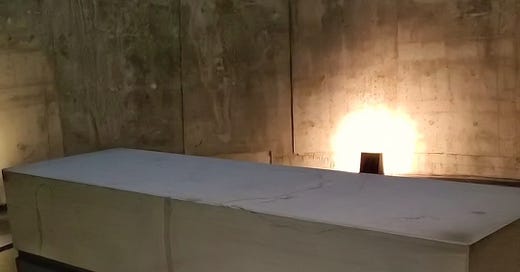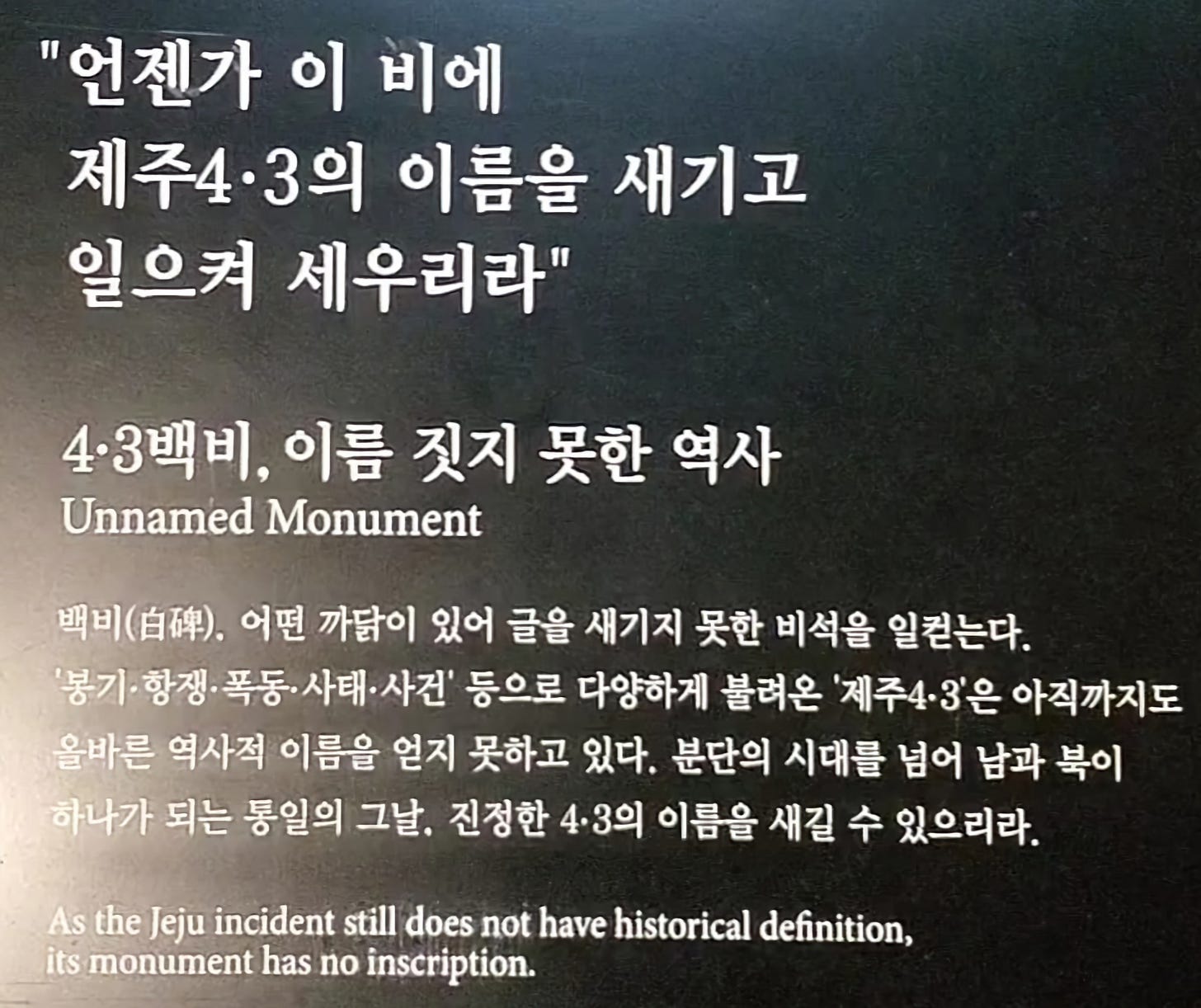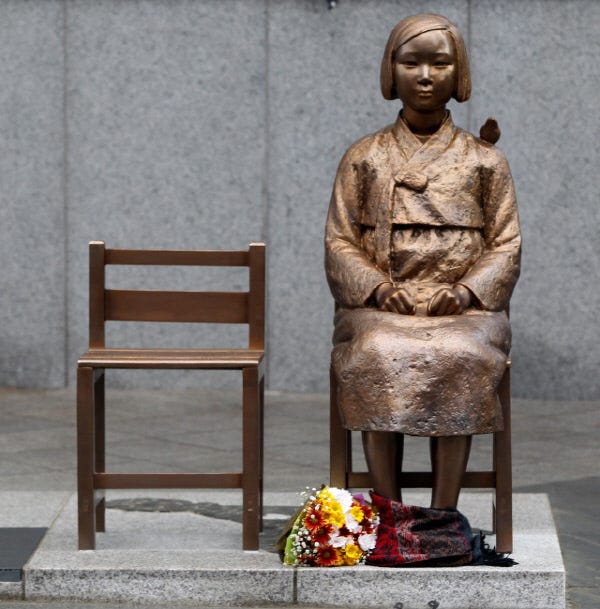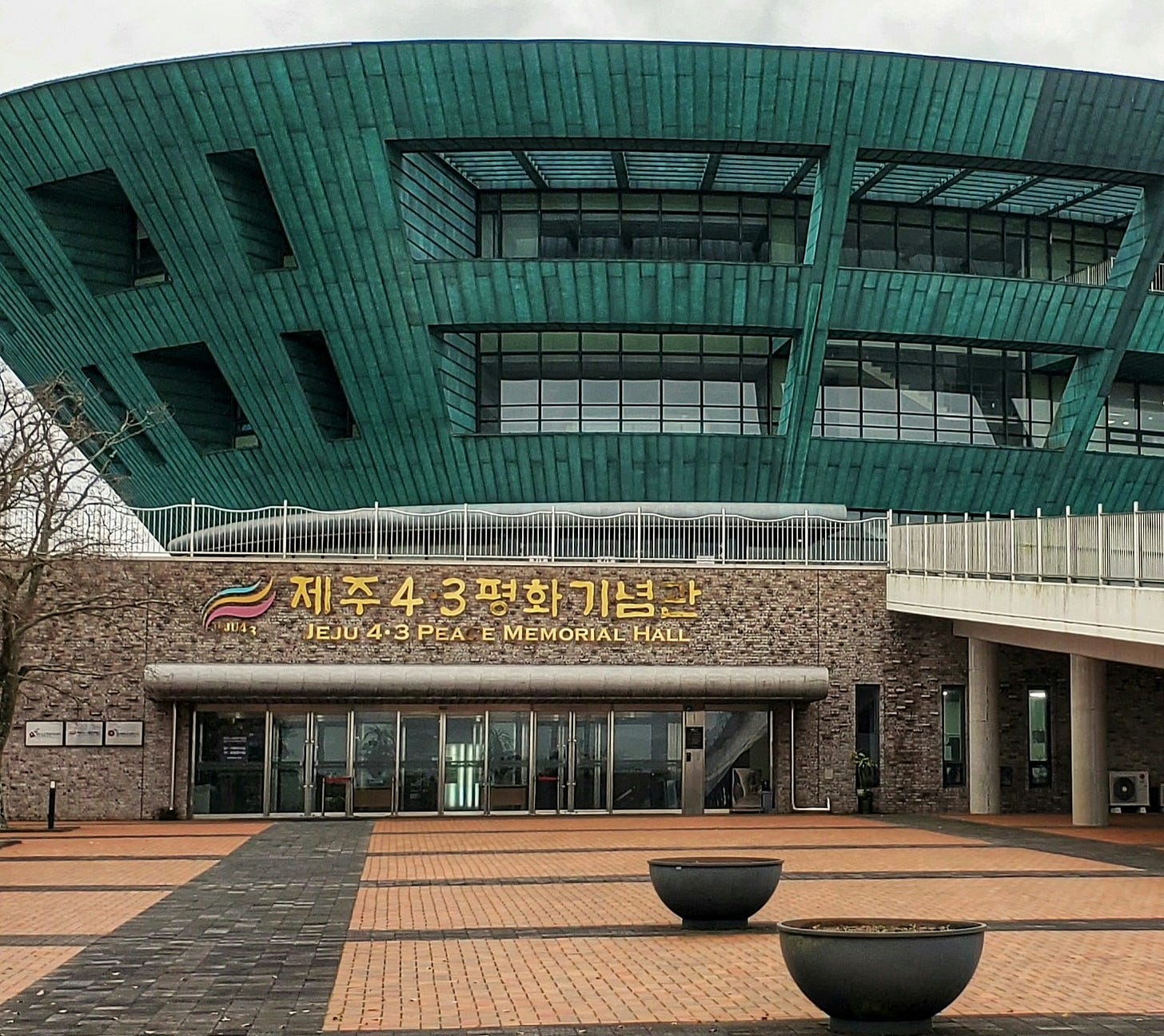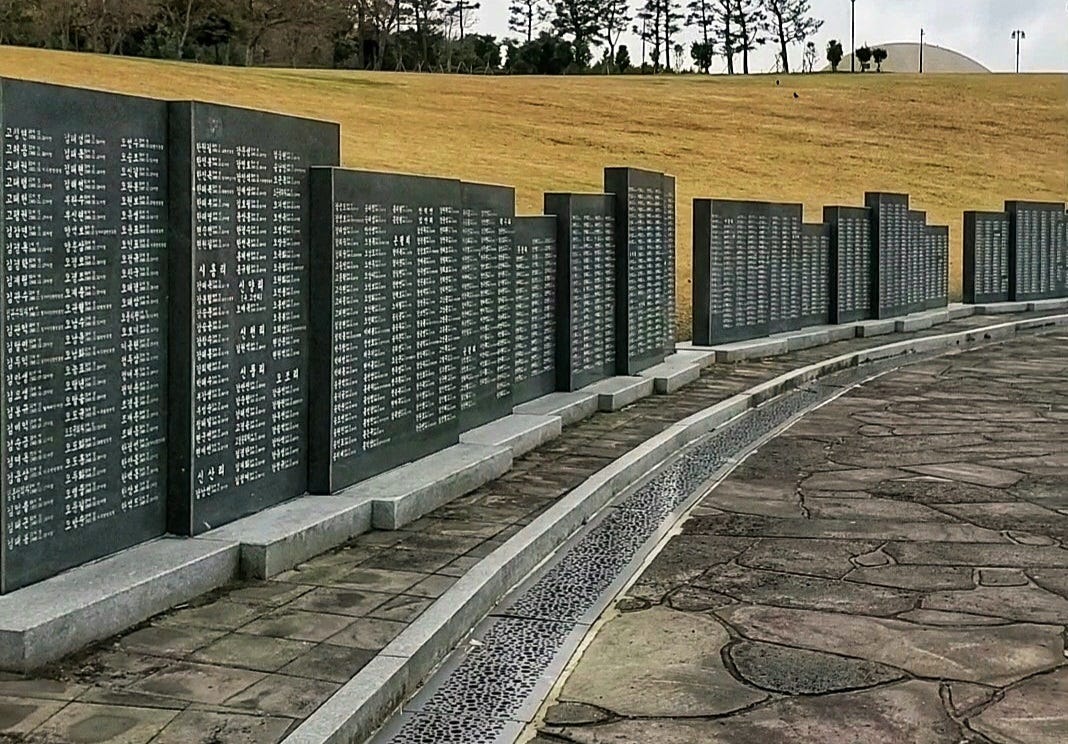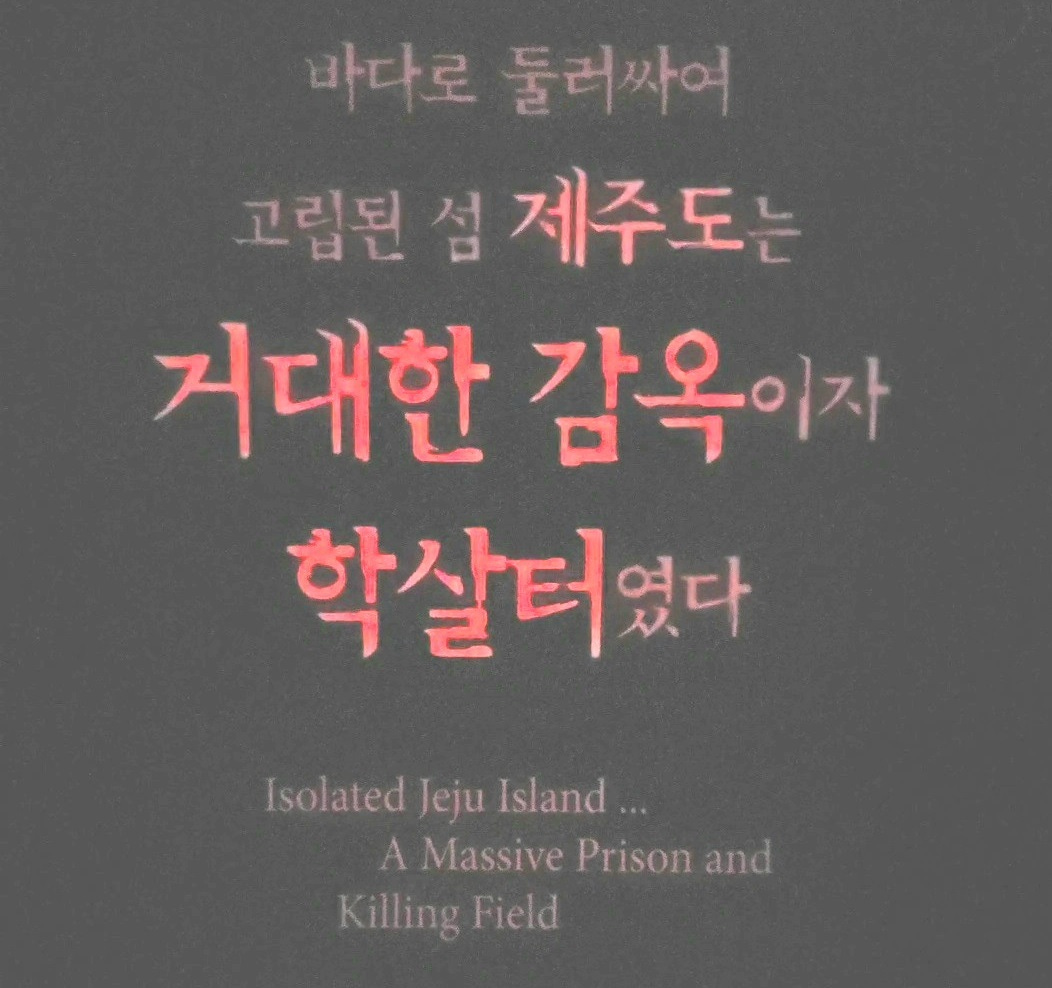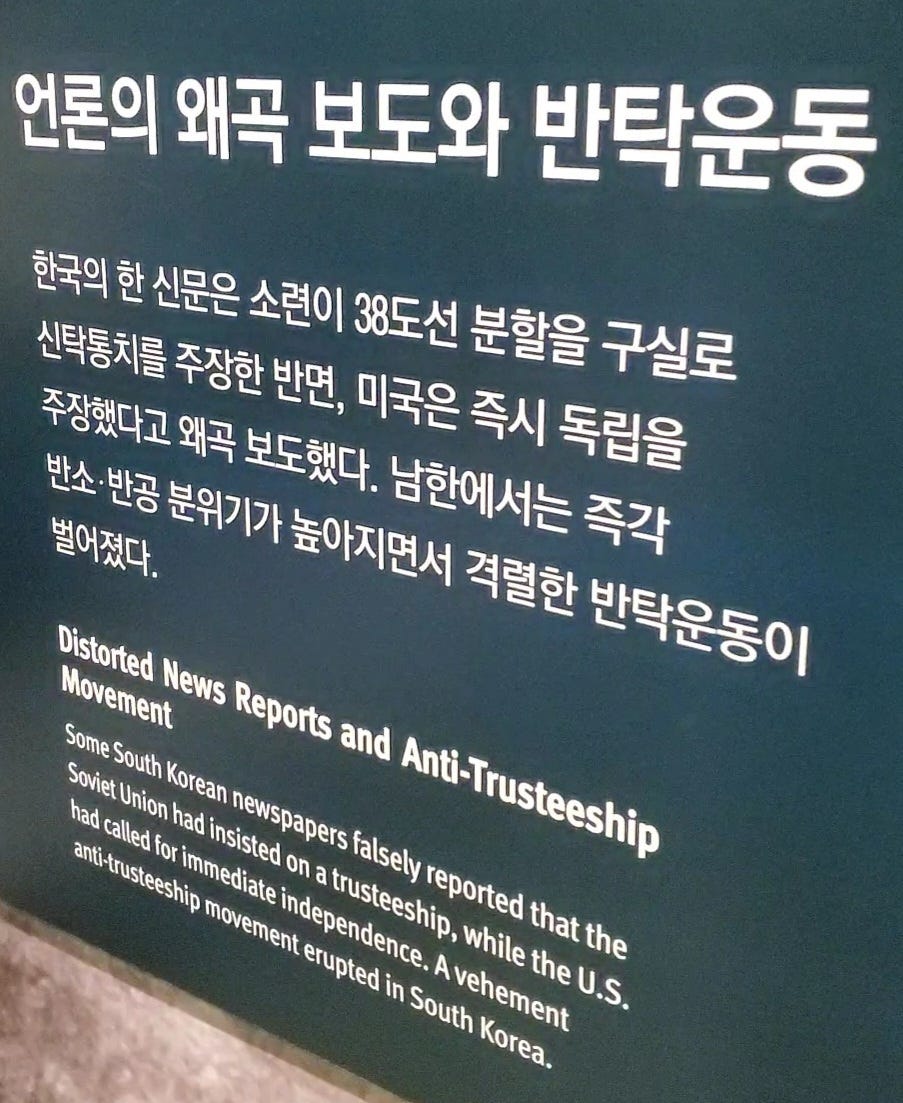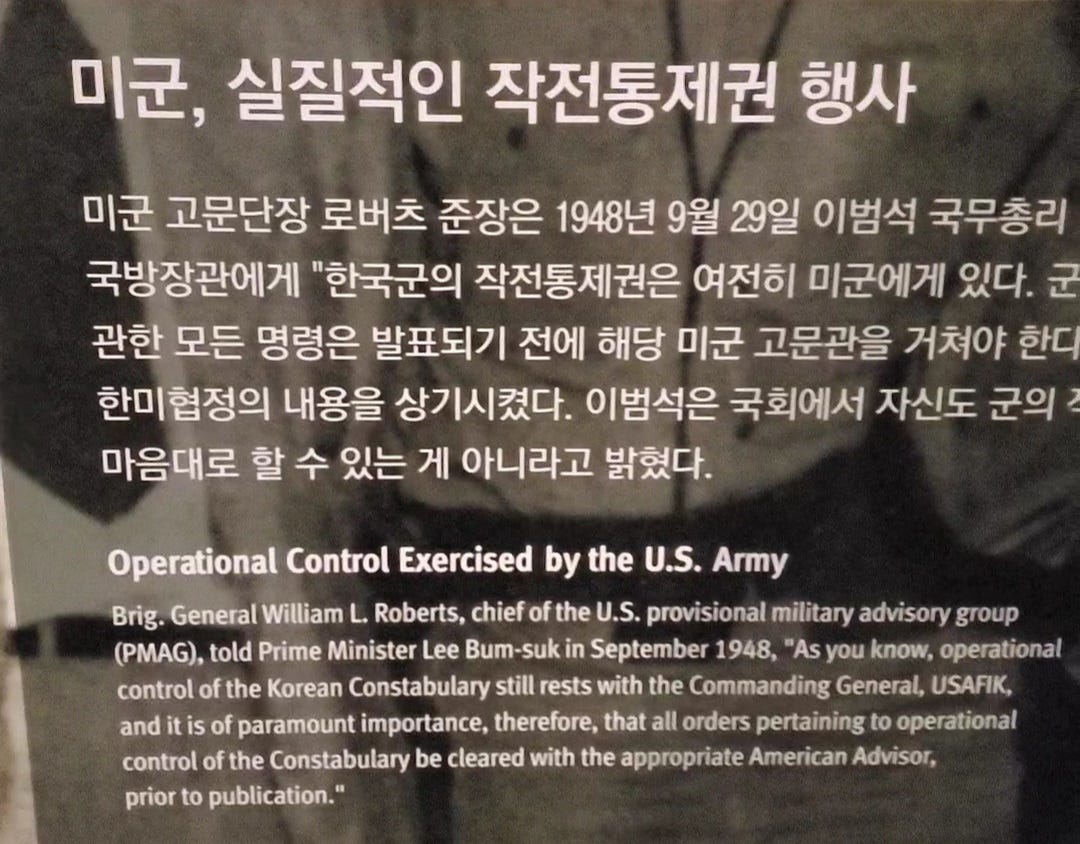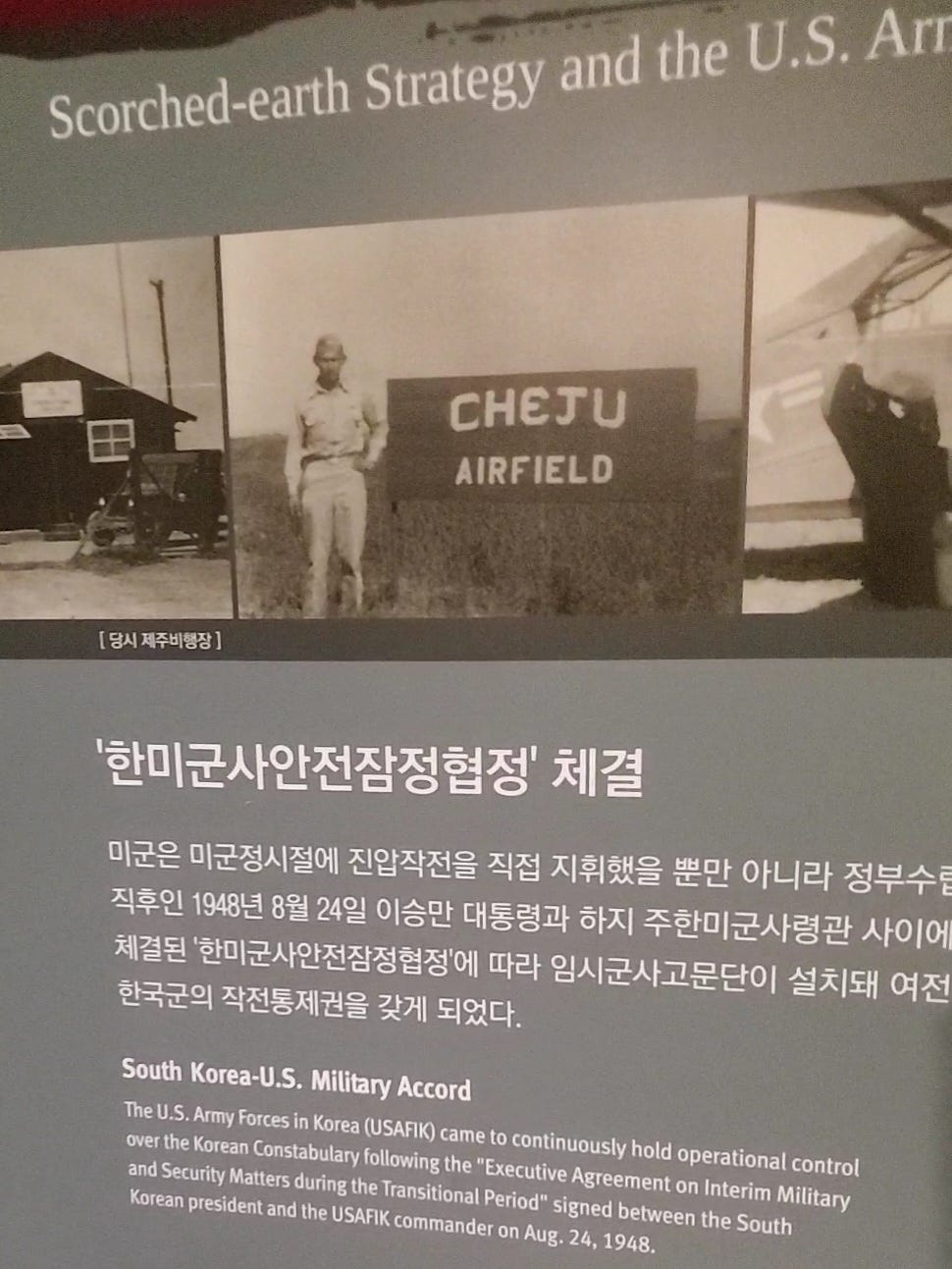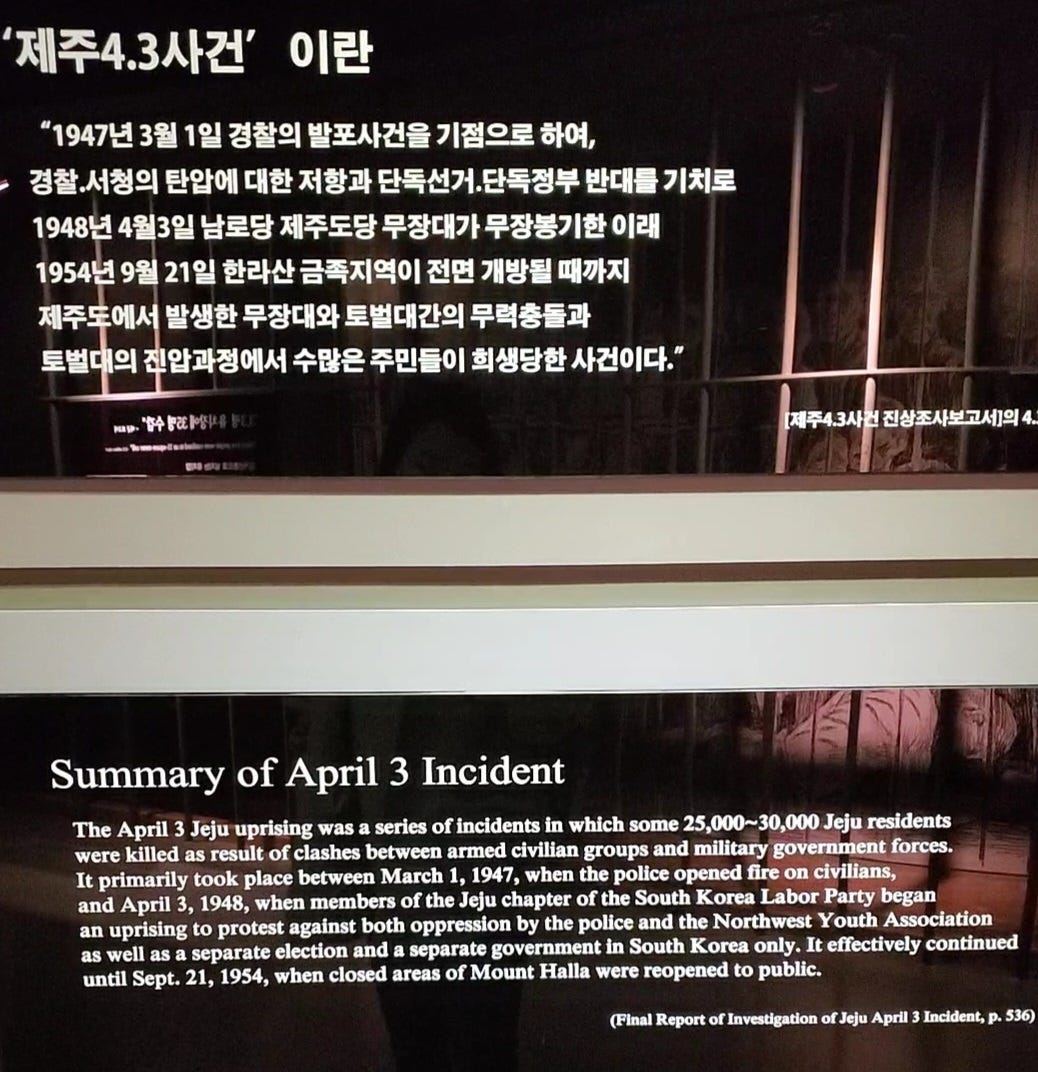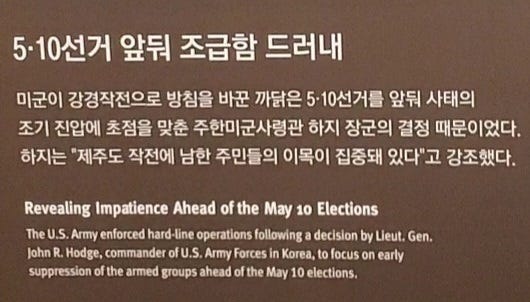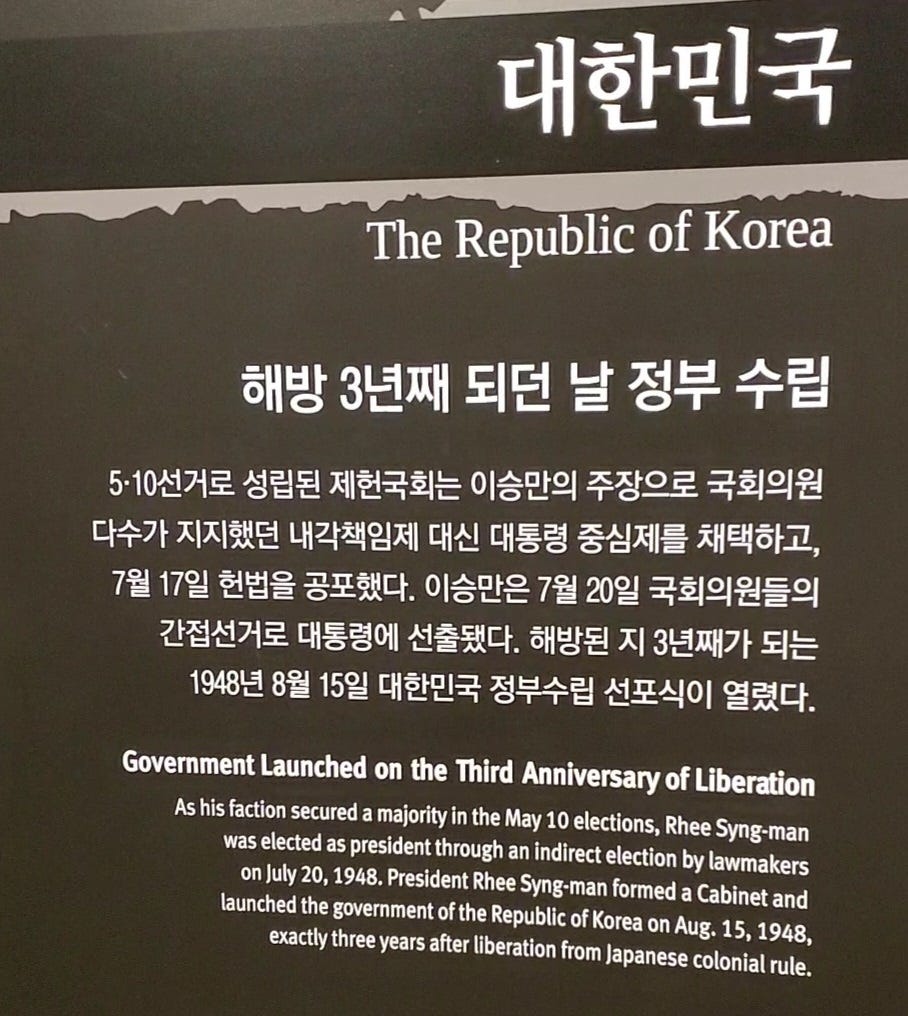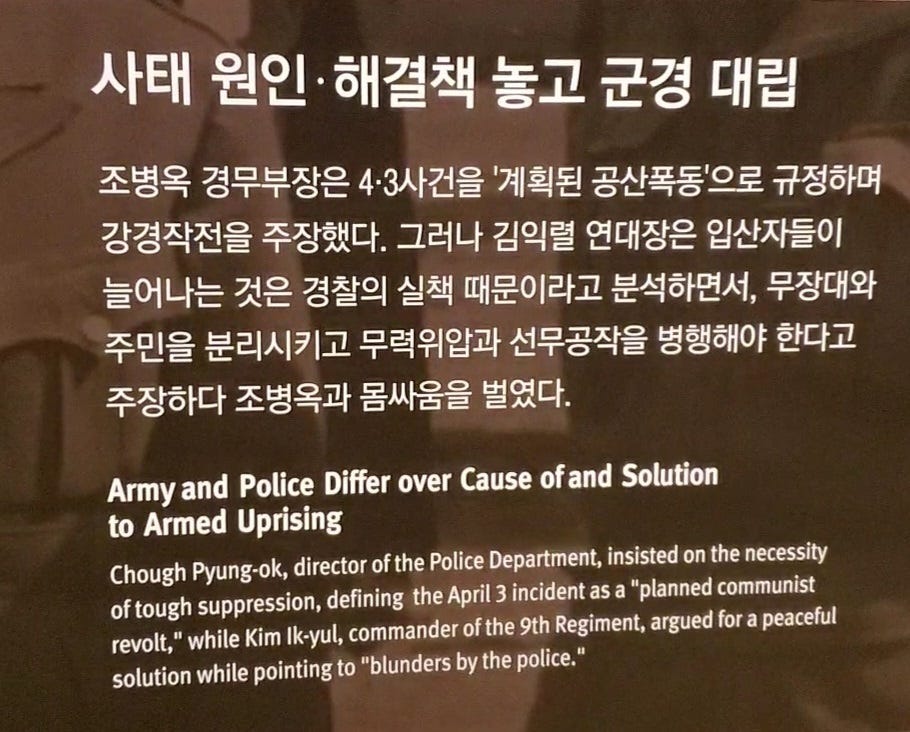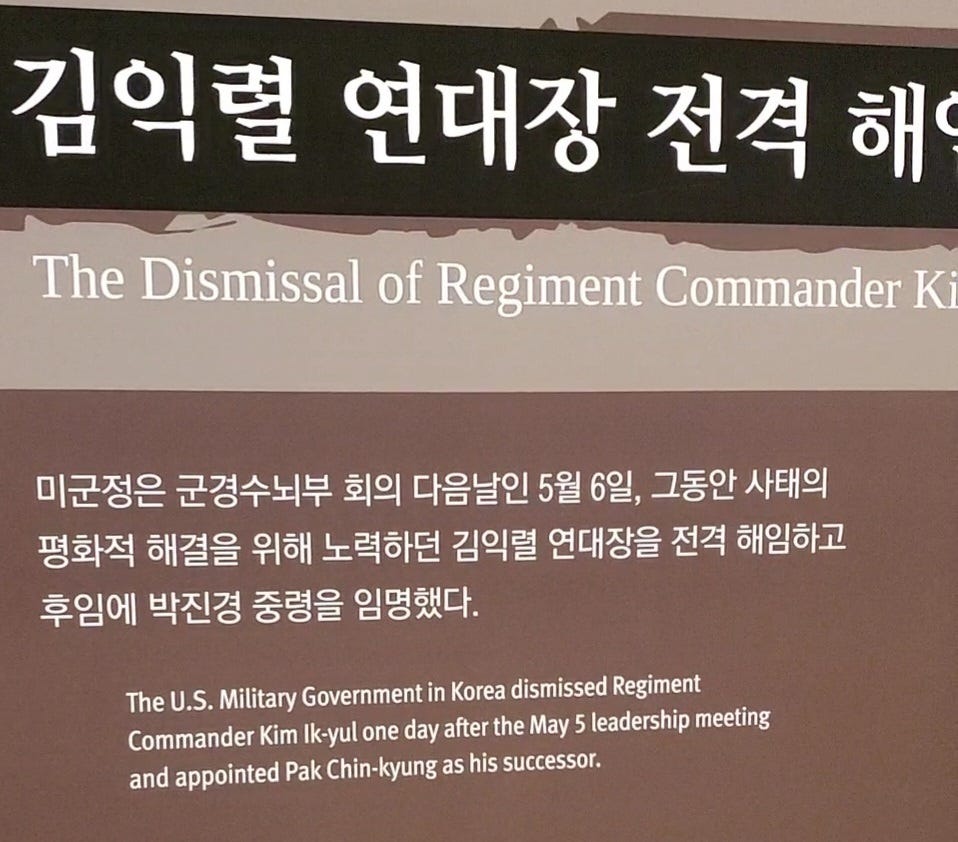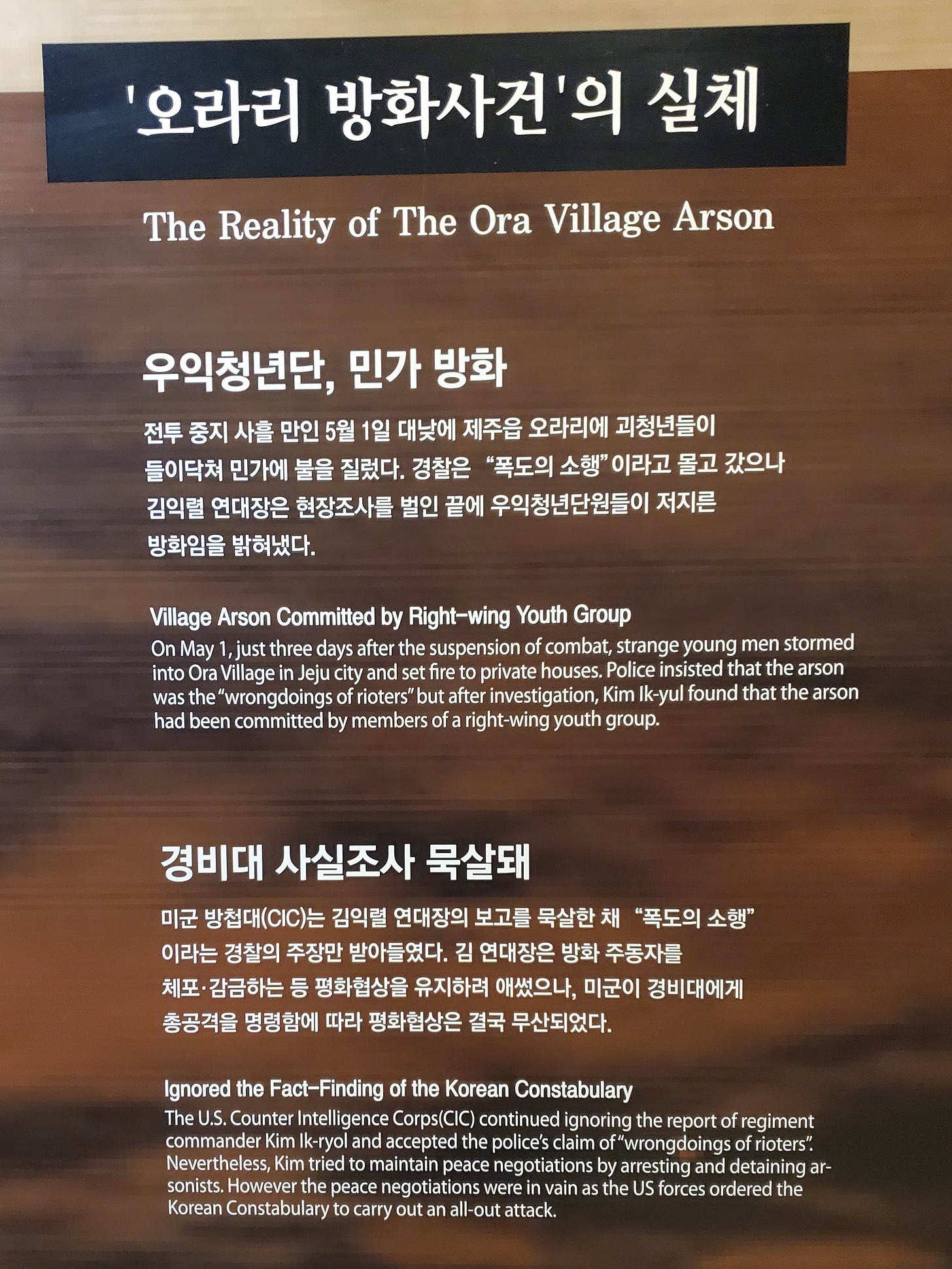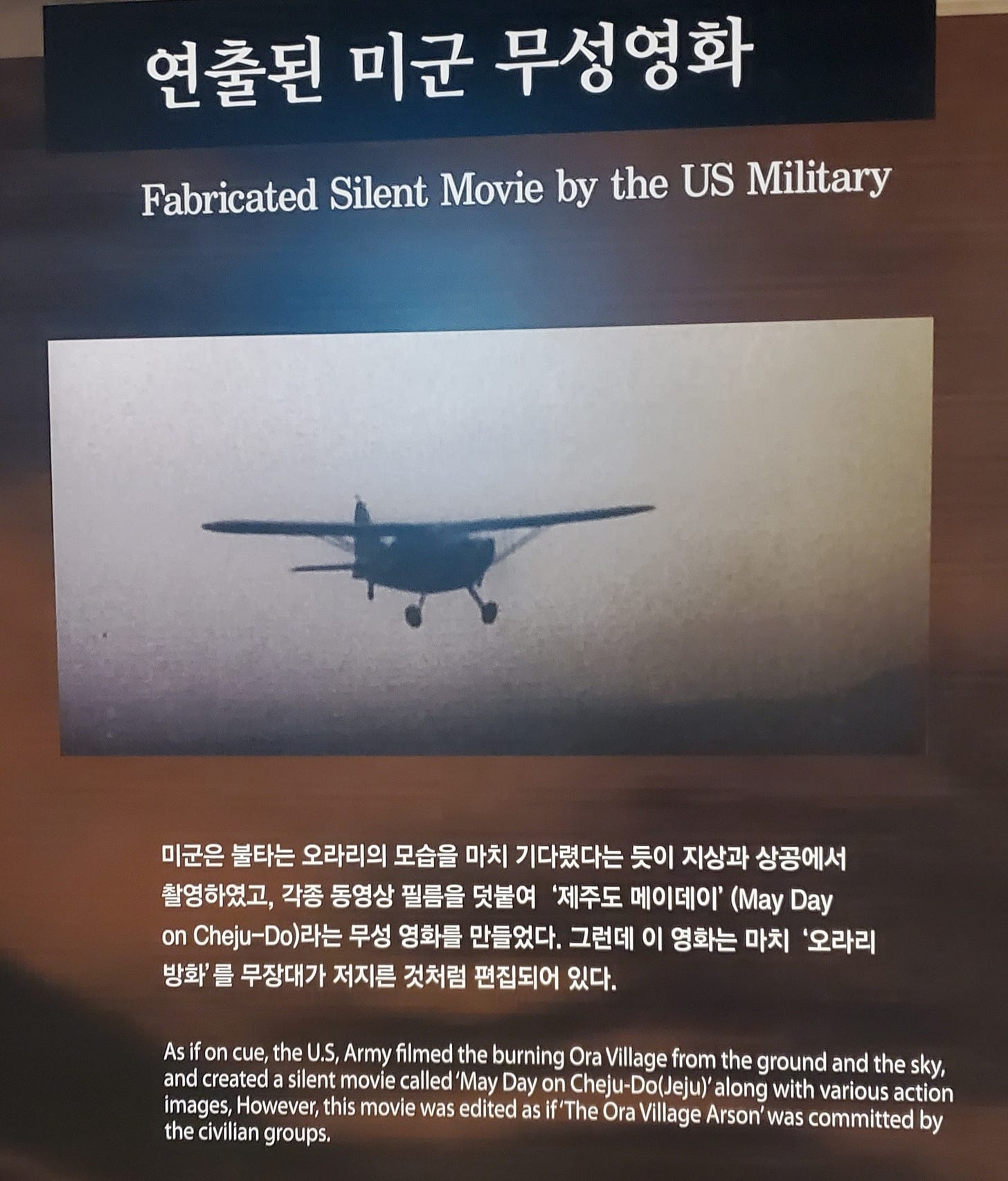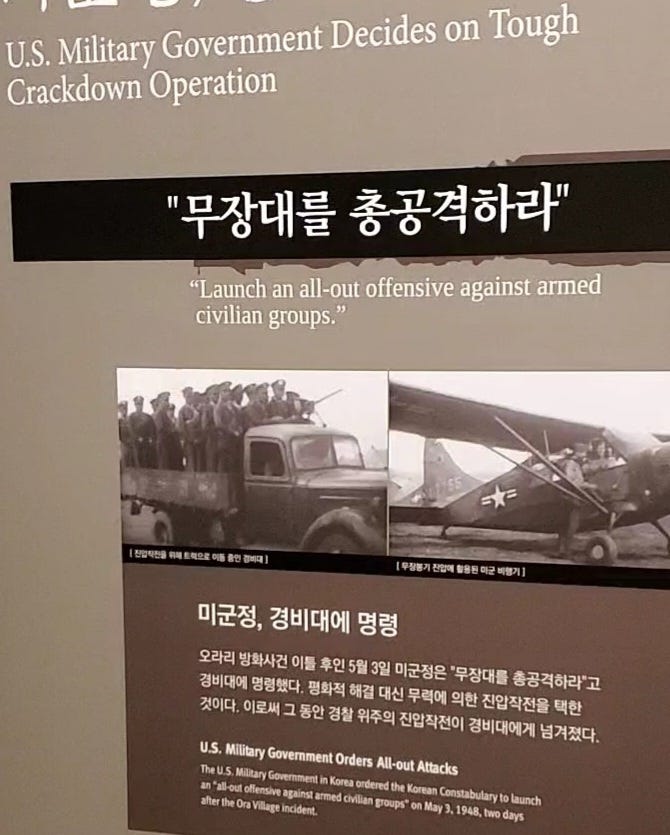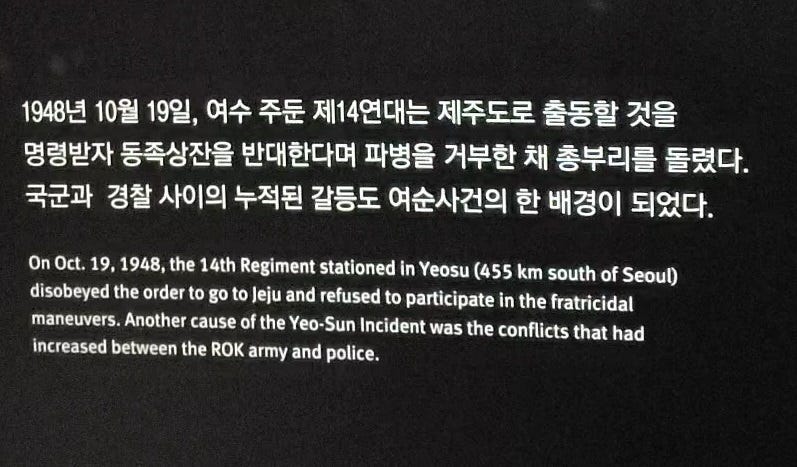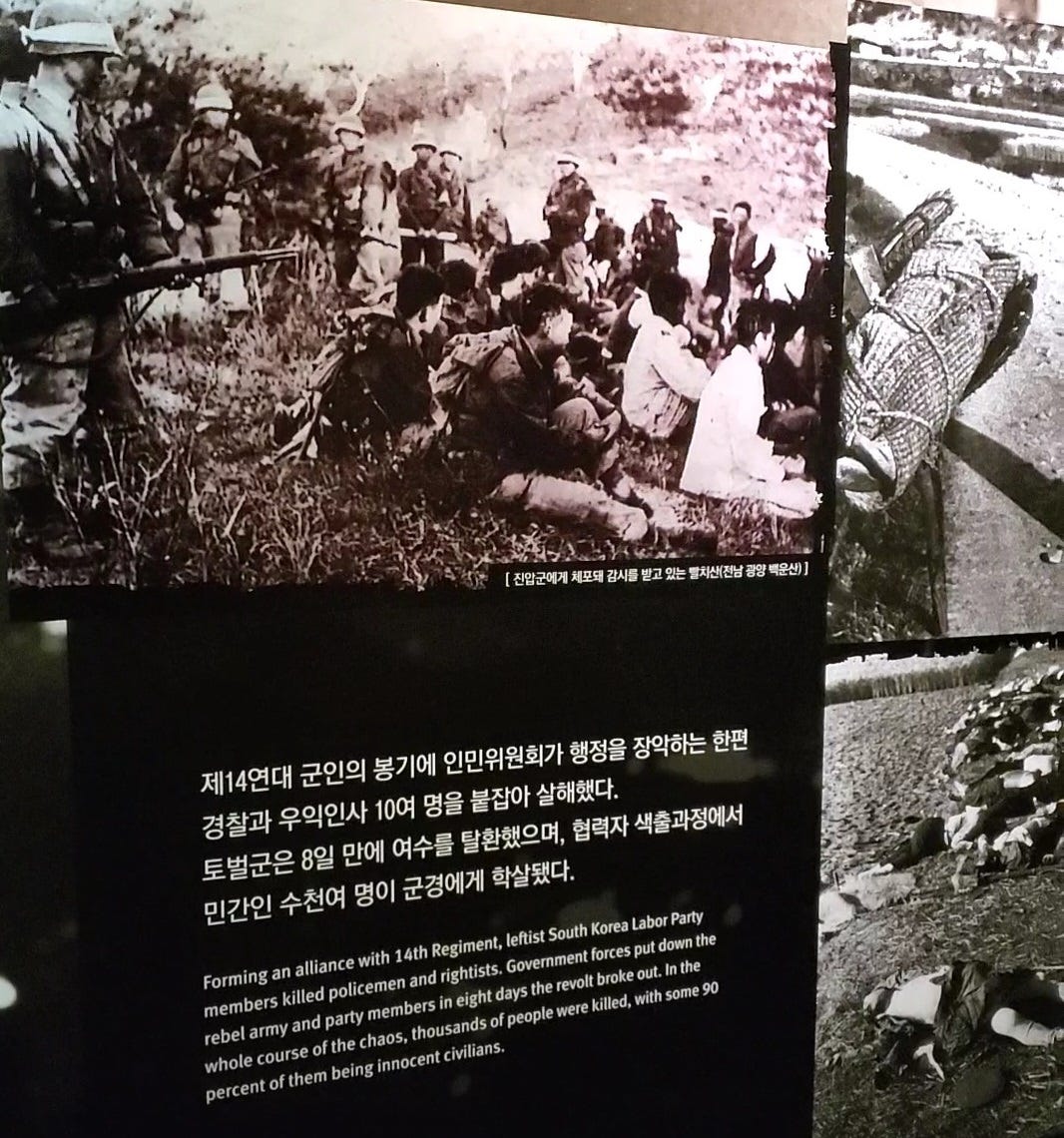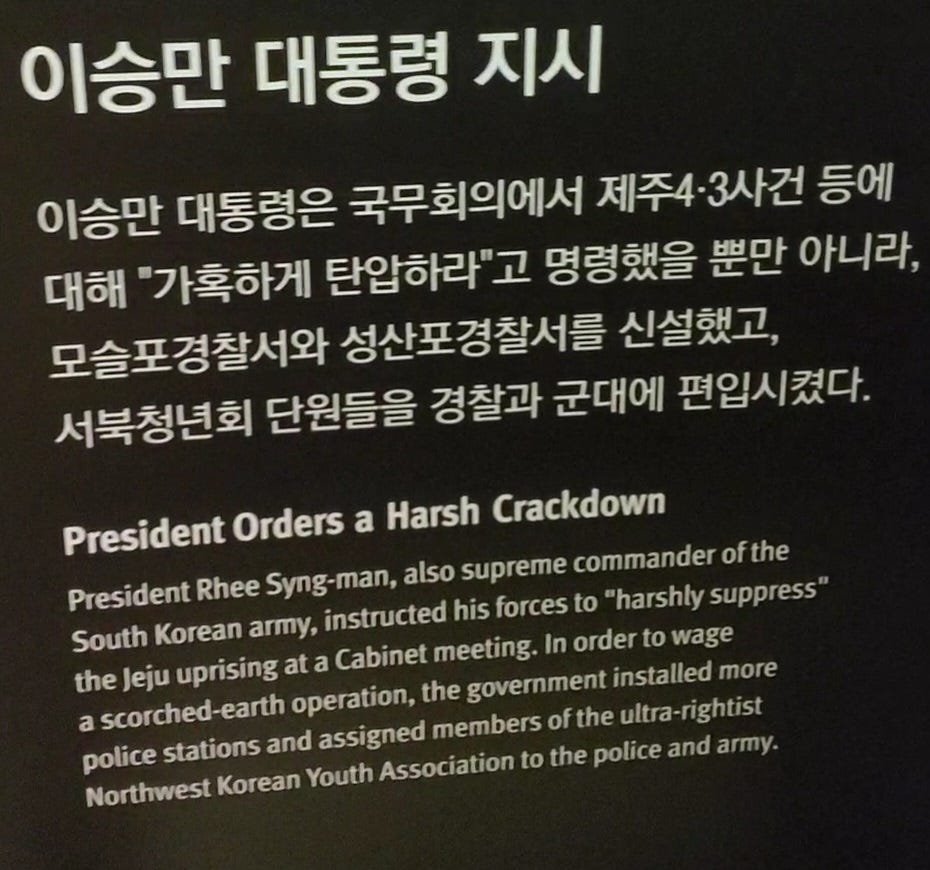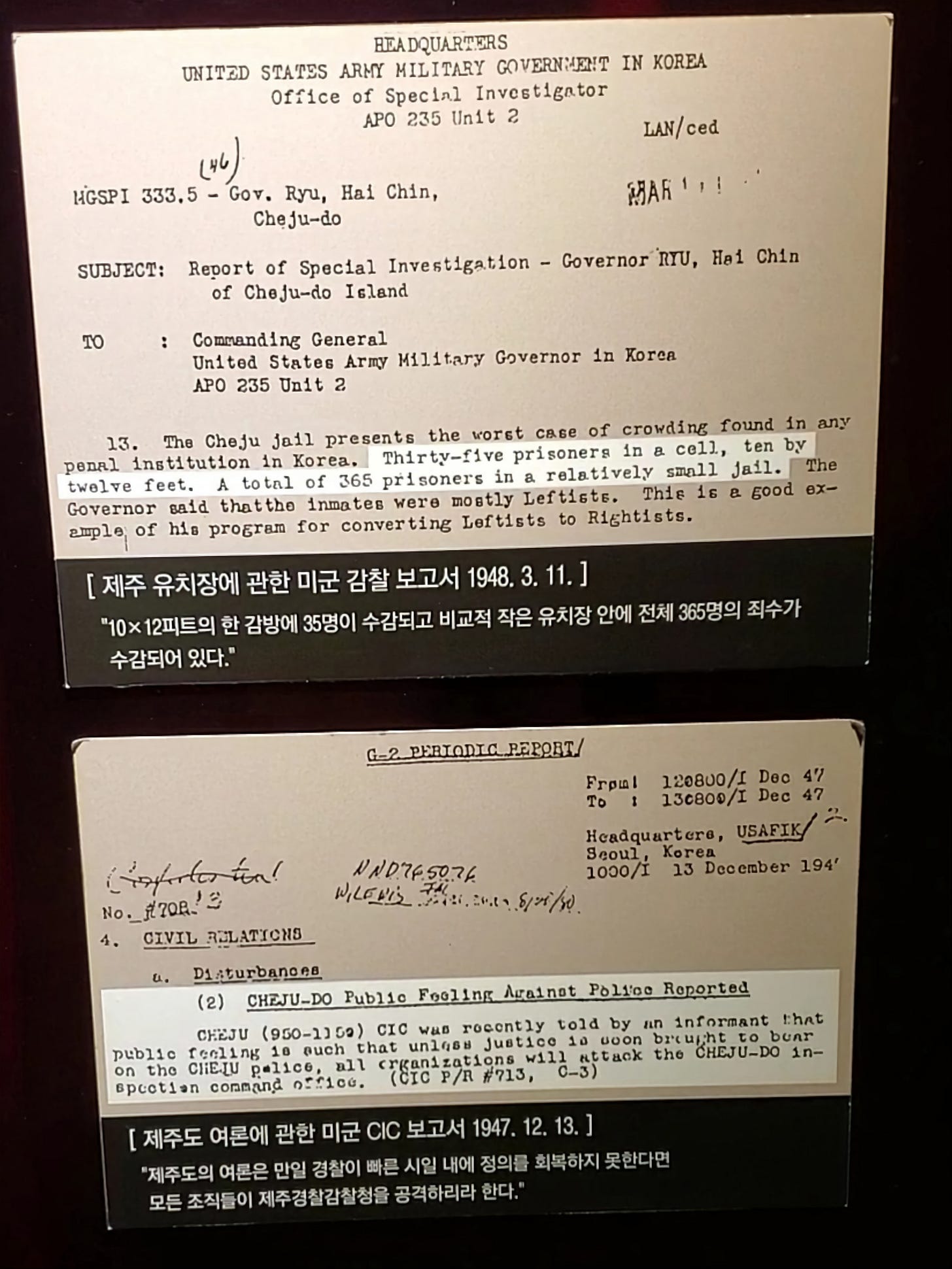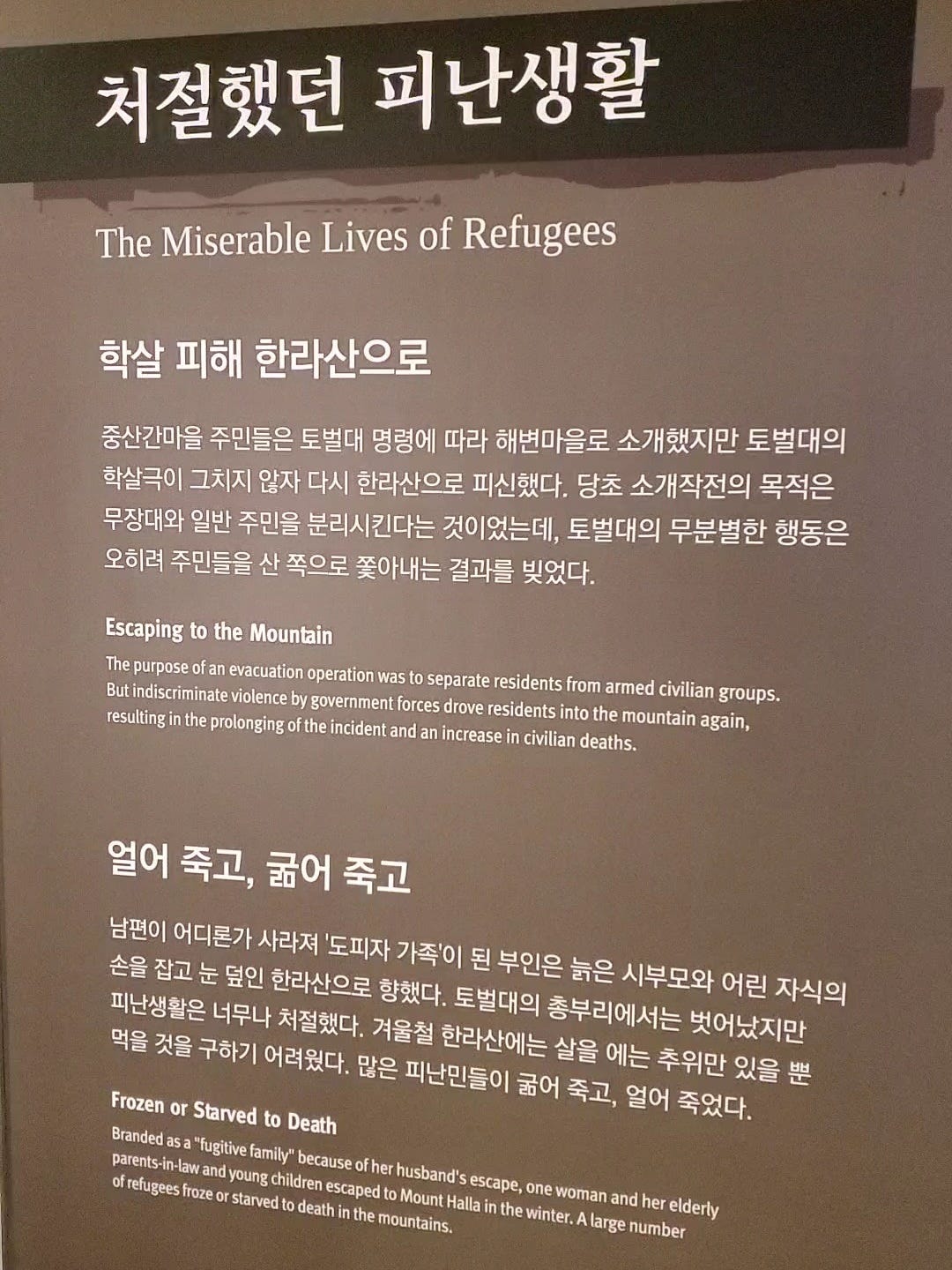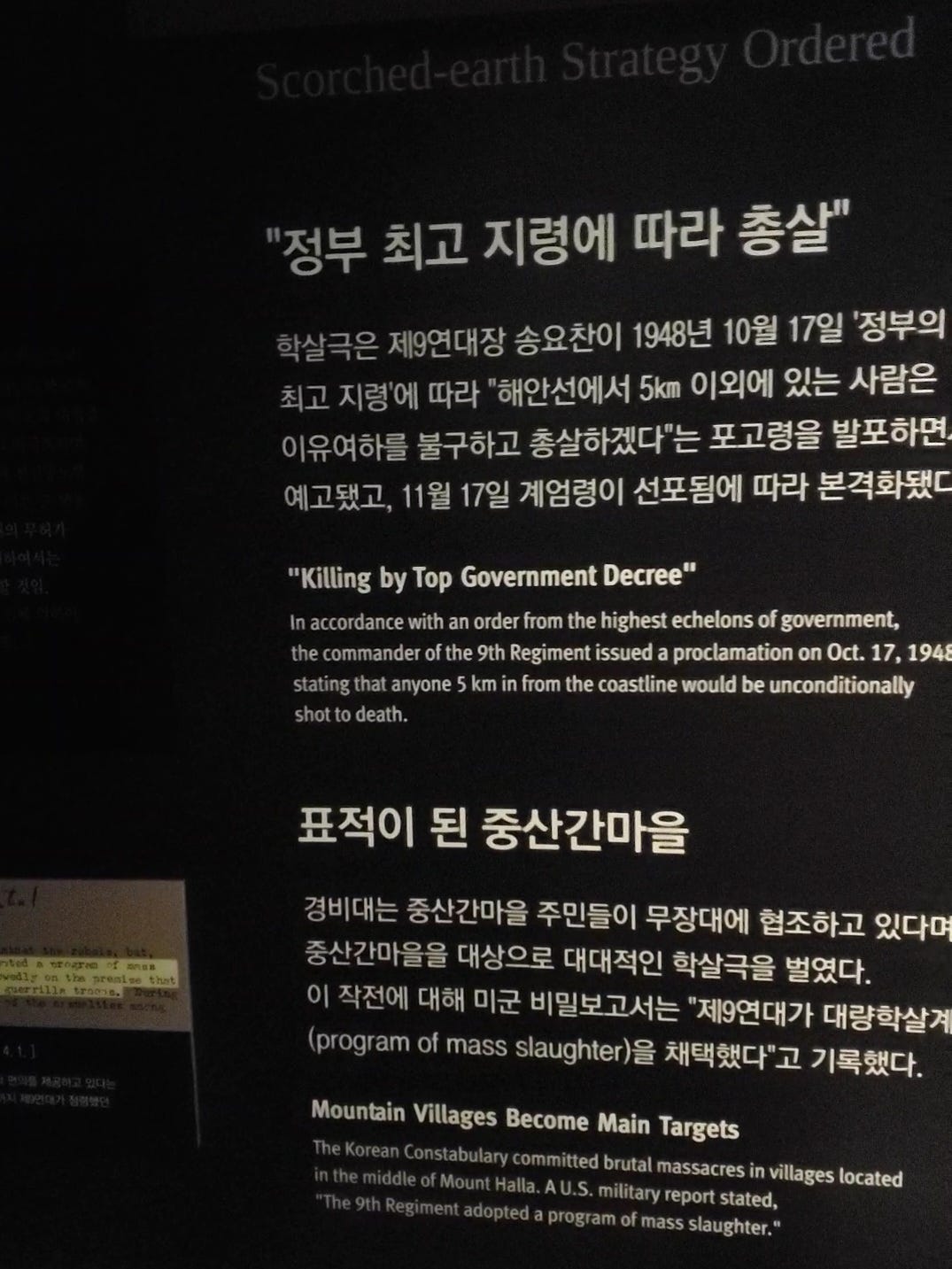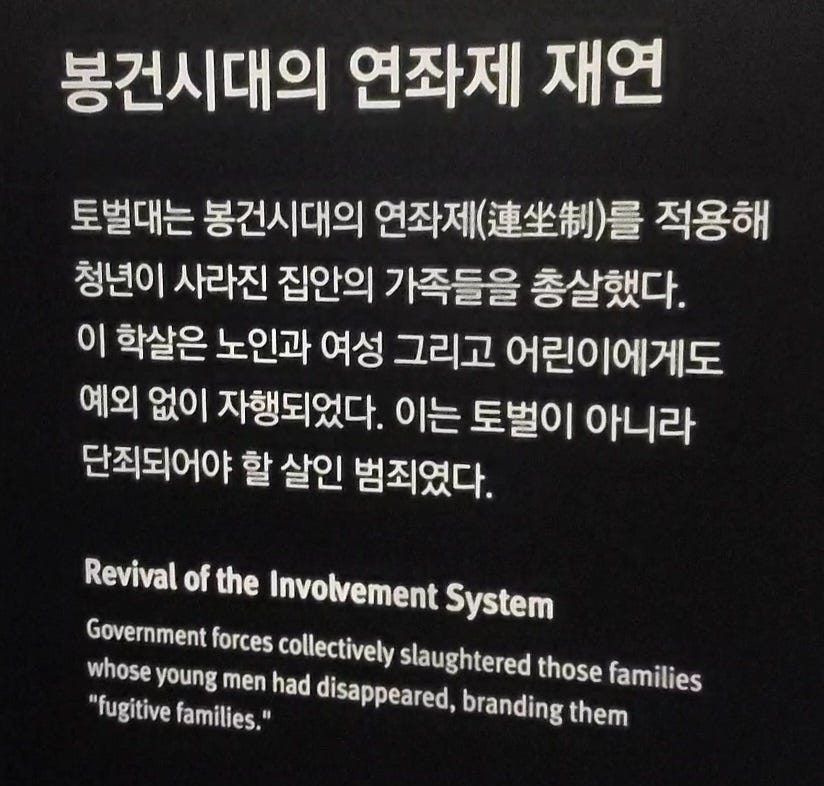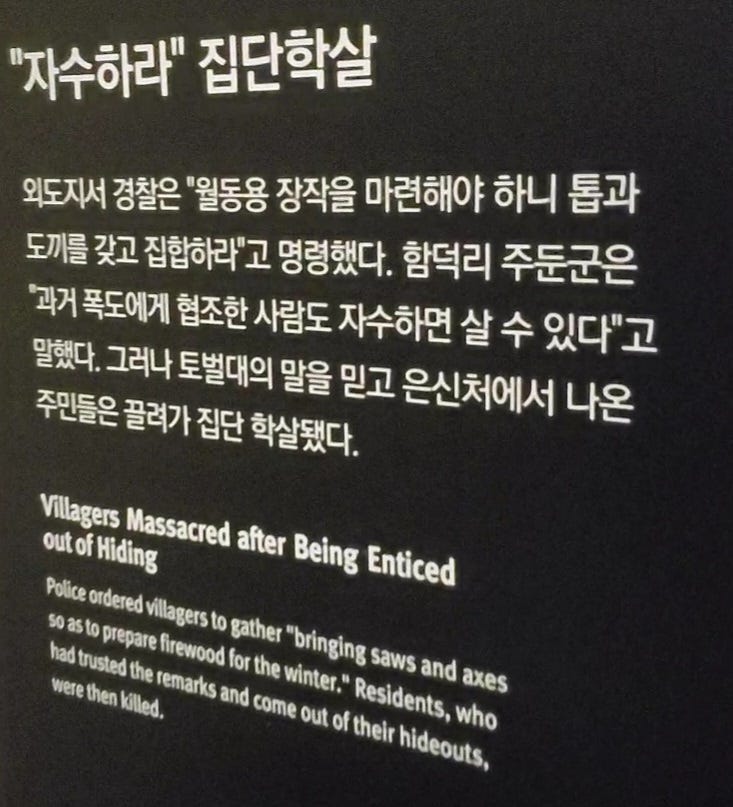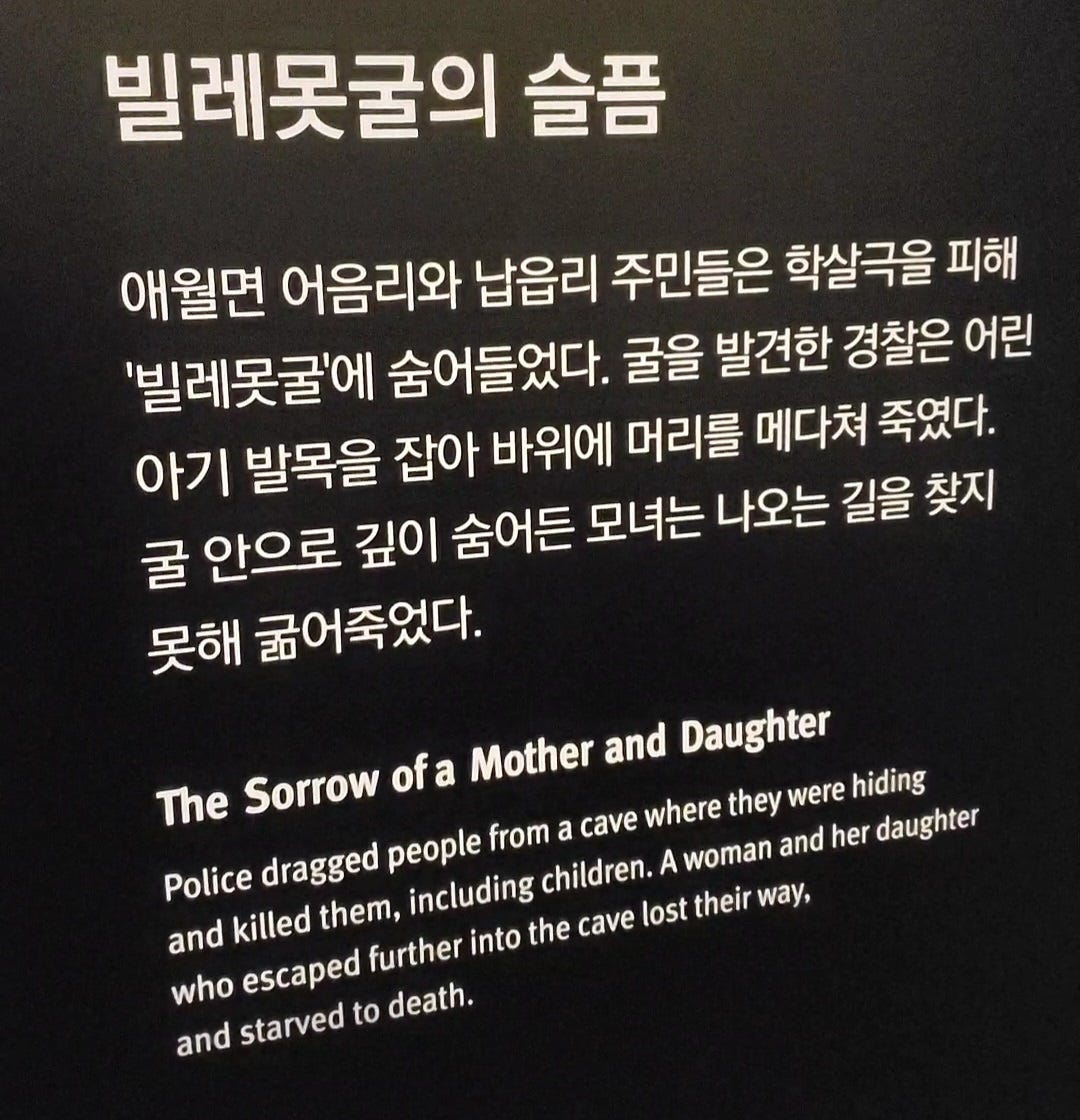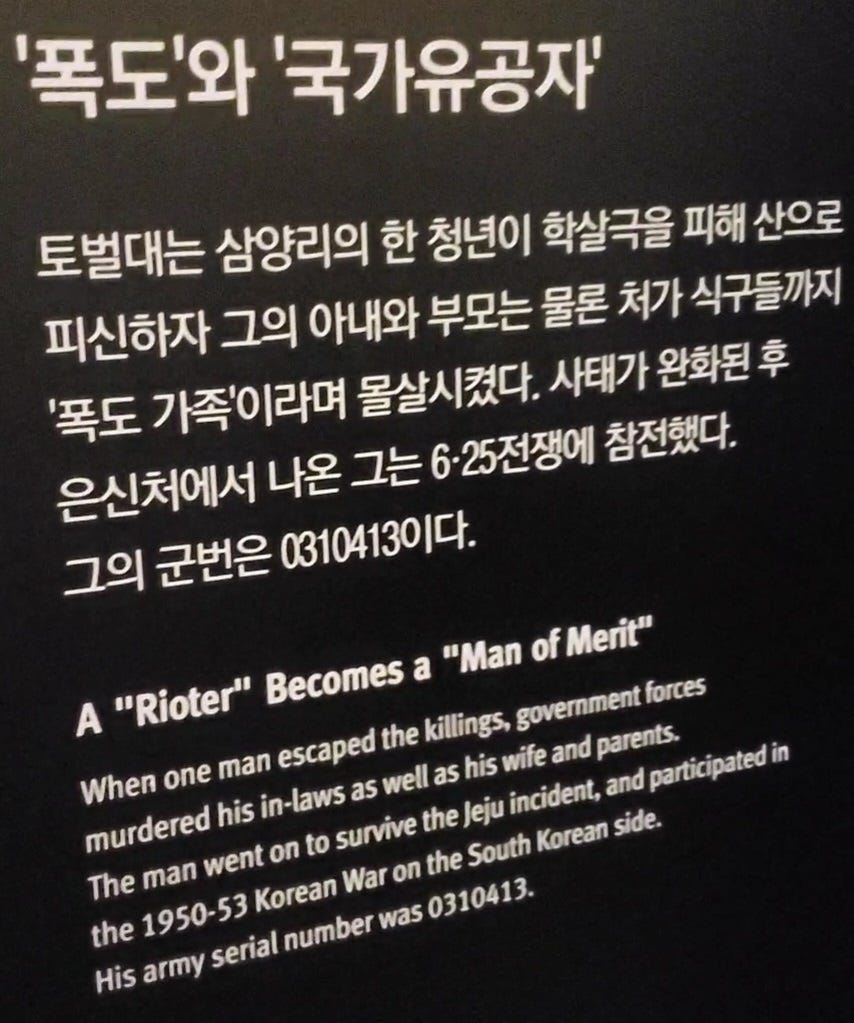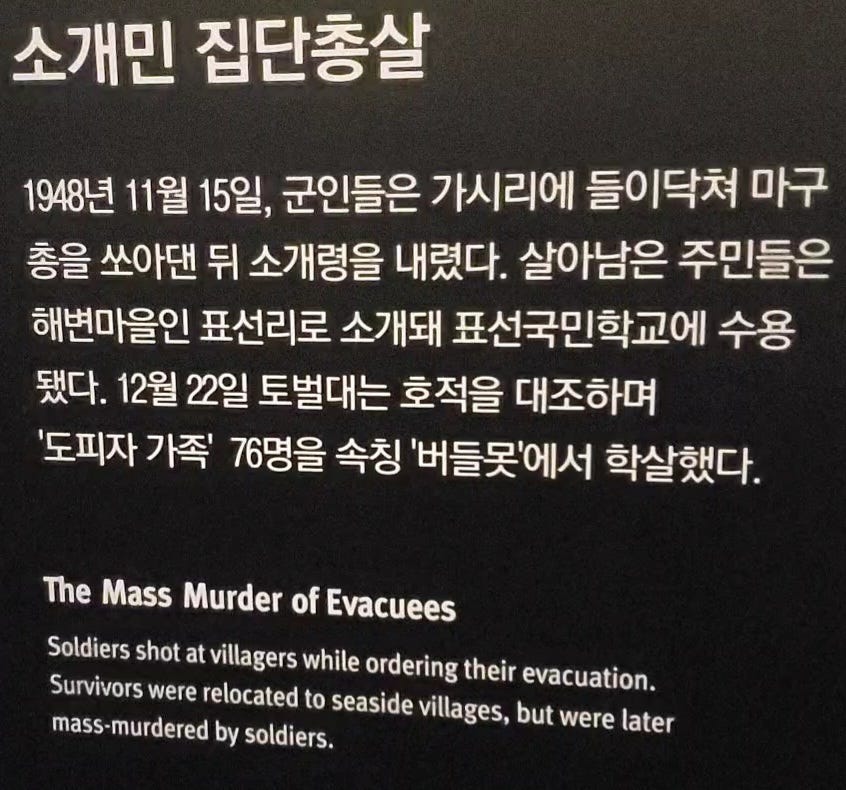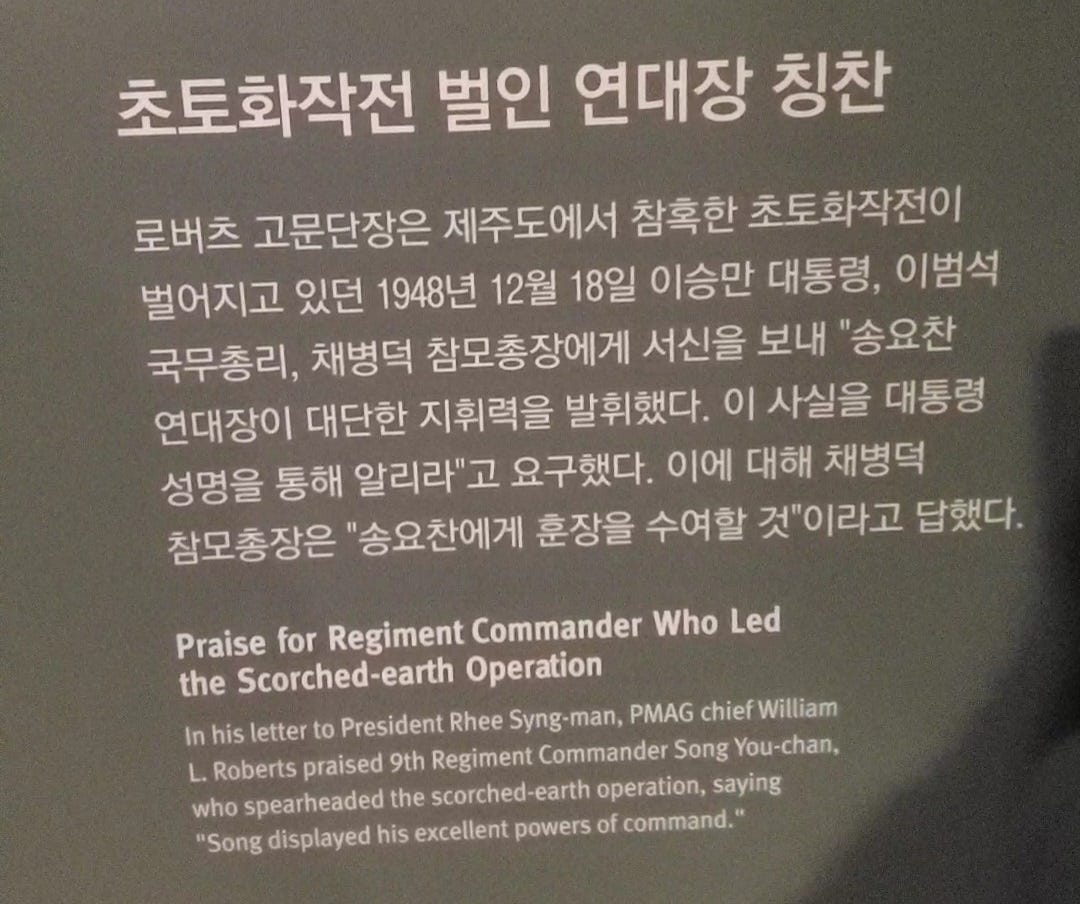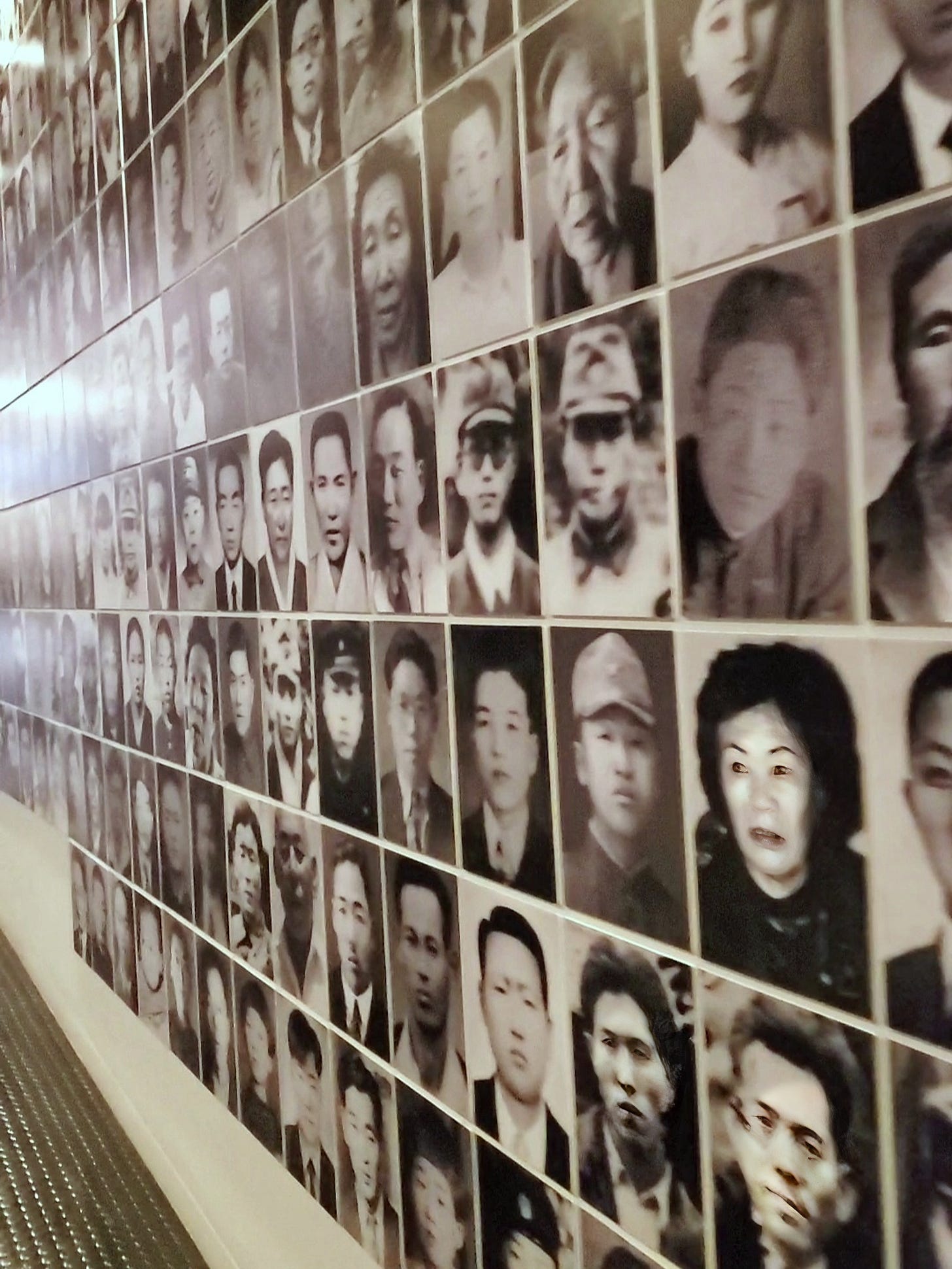My little one finally visited Korea and his ancestral home of Jeju Island. What was once a paradise, the US, in its own words, turned to "scorched earth."
Because of the still existing censorship law in south Korea and south Korea's political relationship with the US, this monument for the genocide in Jeju is called the "Unnamed Monument."
You can talk about what Japan did in Korea, but you still can't speak openly about what the US did after.
This is also true for the sexual enslavement of Korean women. You can talk about what Japan did and even write books and TV shows about it, but you can't mention how the US continued sexual enslavement in Korea, which overlaps with the adoption industrial complex, fascist "social cleansing" programs, the "deorientalizing" of Korean women, and manufactured Korean beauty standards.
Wherever there are US military bases, there is sexual assault and sex trafficking, but the cries of the native people go nowhere, and nothing changes. Subsequently, what the US prefers in local women, and the money that comes with that, influences local beauty standards. Similarly, tourism exacerbates colorism in the Global South because Westerners prefer light-skinned locals.
The end of Japanese colonialism should have been a happy day for Koreans, but there was already division.
From the Jeju Peace Park website:
"[F]or those who had colluded with Japan, independence was a worrisome time amid calls for collaborators to be brought to justice."
After the Japanese occupation, Korea had a democratic, unified government that Koreans ran under the People's Committee.
From the Peace Park:
"People's Committee enjoyed widespread popular support and was established throughout the country, the US forcibly dissolved the committee so that it could effectively rule the country. It was, however, the US policy of rehiring officers from the Japanese colonial era that most antagonized Koreans."
The Americans put the Nazis back in charge of their victims.
The people of Jeju courageously resisted this order by the US and wanted an independent Korea run by Koreans. They were done with occupiers.
The political labels became simple. Anyone who wanted a US-ruled Korea was a "rightist," and anyone who wanted independence and punishment for collaborators was a "leftist." This was an easy decision for the collaborators, who would still enjoy their power and avoid prosecution for their crimes against humanity by siding with the US. These same Koreans, who later formed death squads, are the Koreans the US uses to write the narrative about Korea. They are allies and accomplices.
The Wall of Jejuans murdered by the US and its accomplices is endless. This was revenge for the short period of Korean independence before the US abolished the provisional government. When the land that Japan and its collaborators took was given back to the people.
Whenever a Korean complains the communists took their land, this is the subtext. How did they have so much land under Japanese rule? How did Koreans have old money? Where did this wealth come from?
Many Koreans have skeletons in their family closets. Many of these skeletons are Jejuans. US fascism murdered roughly 30-40,000 Jejuans. Another 40,000 fled to Japan. Imagine how bad it was for Koreans to escape to Japan. One in five Jejuans were now missing from Jeju.
Yet you can't use the proper political terms like "murder," "fascism," and "genocide" because you can't apply that to the US, and if you do, it's at your peril. So Koreans have to call it an "incident" or use dates.
These US massacres weren't just happening in Jeju but throughout south Korea, all before the war. It got so bad that people in Japan complained about all the Korean bodies washing ashore. As bad as Japan treated Koreans, imagine how bad Korea was for Koreans in Japan not to want to come back.
The US covered this up by blaming it on north Korea, but the Truth and Reconciliation Commission by the south Korean government found that it was actually the work of the Americans. If these are the horrors used to demonize the north, what should we think now about the US? But that would mean we were supporting, praising, and pledging allegiance to fascism all this time. That's the rub. (It's no wonder the original US pledge used a palm-out salute that was later adopted by the Nazis. Same imperial inspiration.)
Yet how hard is it to say we were wrong? Is our pride worth more than all these Korean souls who can never rest in peace, be acknowledged, or get justice so long as we keep protecting their victimizer?
It is becoming less, and less of a controversial take for Koreans to say the Korean War was the fault of the Americans. Why wouldn't Koreans resist the oppression of Koreans by a new foreign occupier? The same ones who had embassies in Korea during the Japanese occupation and collaborated with them.
The war started years before 1950, as soon as the US abolished the Korean provisional government. The military in the south also launched several skirmishes and strikes against the north. Though with the current fascist regime in south Korea, it's again unsafe to speak about this. The pro-US regime has also gone back to attacking labor movements in Jeju.
The whole genocide of the Korean peninsula, from before the war to the war and after, lies at the feet of the US. Of course this is painful, and many Koreans will deny this, as will the West, because it would mean you've been sleeping with the enemy or you are the enemy. So, of course, some will die on a hill to deny it. Some will deny it because they benefit from the lie. Revelations of the truth could indict them or their family's past. It could mean reparations. But rewriting history and promoting capitalism and property rights ensure you never lose what you got.
All intergenerational Korean traumas are not the same, except the voice of the oppressors has privilege that the families who died under them don't.
Fake news is not new, the US was running propaganda with the help of Japanese turned US collaborators. Controlling the narrative means making the US always the good guy.
Many visitors to Jeju aren't even aware of the Peace Park or the tragedy there, just as most Korean rituals are abandoned or decoupled from their spiritual elements. The old gods were additional victims of the massacres. How many Koreans no longer celebrate or know the spiritual significance of the moon or the festival around it? How many now pray to a God brought over by America?
Even after the US military government in Korea, the US kept operational control. This is still true today.
The US was still very much in charge even after appointing its puppet government. It initiated scorched earth in Jeju.
Jejuans wanted democracy and fair elections, and that's when the nightmare began.
Orders by the US to kill anyone who demanded democracy.
The US did not bring democracy to Korea, it brought a fascist dictatorship paved with blood.
There was a Korean commander who wanted a peaceful resolution in Jeju.
The US, of course, dismissed him. It didn't want peace but to send a warning to the colonized world, like Indonesia, of what happens when you oppose US authority.
Members of death squads (who worked for the US) set fire to a Jeju village, but the US used this as cover for an all-out assault on Jeju. The US prides itself in its ability to weaponize lies and outspends all other countries to do it.
The US constantly fabricated movies and news to promote its lies in Korea. But unfortunately, the lies still stand while the truth lives in whispers.
The US orders the genocide of native Jejuans. My people.
One regiment disobeyed the orders.
They were slaughtered along with thousands of civilians, including children.
The government deputized death squads and gave them license to torture, mutilate, destroy, and sexually assault (including children). Not only were they not punished, they were rewarded. They're the "heroes" who fought "communists." The ones Americans spotlight to talk about how the US "saved" Korea. The US is still very invested in that story remaining intact. If history is corrected, its current place and how it got there get questioned.
Imagine what this did for rape culture, toxic masculinity, and misogyny in south Korea. Especially since it got the approval of the world's moral authority, the US.
Telegrams from the US secret police in Korea about their imprisonment and torture program of Jejuans, purposely overcrowding as a form of torture and giving them the option of dying or siding with the US.
If the use of secret police makes you fascist, again, what does that make the US? Everything the US said it fought in Europe, it did in Korea.
Many Jejuans fled to the mountains to escape the killing fields. Many were found and slaughtered, others starved or froze to death. Indigenous Jejuans became refugees of their own country and ancestral home. The US also did this to the Indigenous in North America (and elsewhere).
The order came down to slaughter everyone they found.
If you fled, they killed your family.
The government often used promises of peace to lure Jejuans out of hiding, only to kill them. The plan was to murder everyone.
There was nowhere for Jejuans to hide. Does this sound similar to what the Nazis did? Yet where is the same outrage? Why is it different when the US does it?
One refugee had his entire family murdered, then was forced to fight for the side that killed his family. This was then used as US propaganda, reforming a "criminal" to a "man of merit." This is a metaphor for Korea, victimized and then forced to serve your victimizer. The ones who the fascists tormented were branded the fascists. The murdered were branded the murderers. Up became down. When authority is absolute, it can dictate reality regardless of truth.
All the survivors had to die so no one would be left to speak the truth. But if you managed to survive, you'd be too afraid to speak out.
The US didn't get its reputation as the world's moral authority by being good. It comes from killing so absolutely that either everyone is dead or no one dares contradict you. Silence from criticism comes from death and terror.
The US praised its Korean collaborators for the genocide.
Never forget what they did in Jeju. Never forget what they did to Koreans. Why hasn't the powerhouse of Asian cinema made a dozen movies about this? Why do they have to use artistic license and metaphors in their criticism? Because Korea is still not free.
Now close your eyes, and imagine this story wasn't about me, my family, Jejuans, or Koreans. Imagine this story was about you and your family. Imagine all those faces and names you saw were the faces of your family members—that it was your face. Then imagine how you'd feel knowing you never got justice and your murderer was celebrated.
Now open your eyes.
⁂
(If you like my work, please support me on Patreon or make a one-time donation on Ko-fi. Find Southpaw at its website. Get the swag at Spring. Also check out Liberation Martial Arts Online.)


